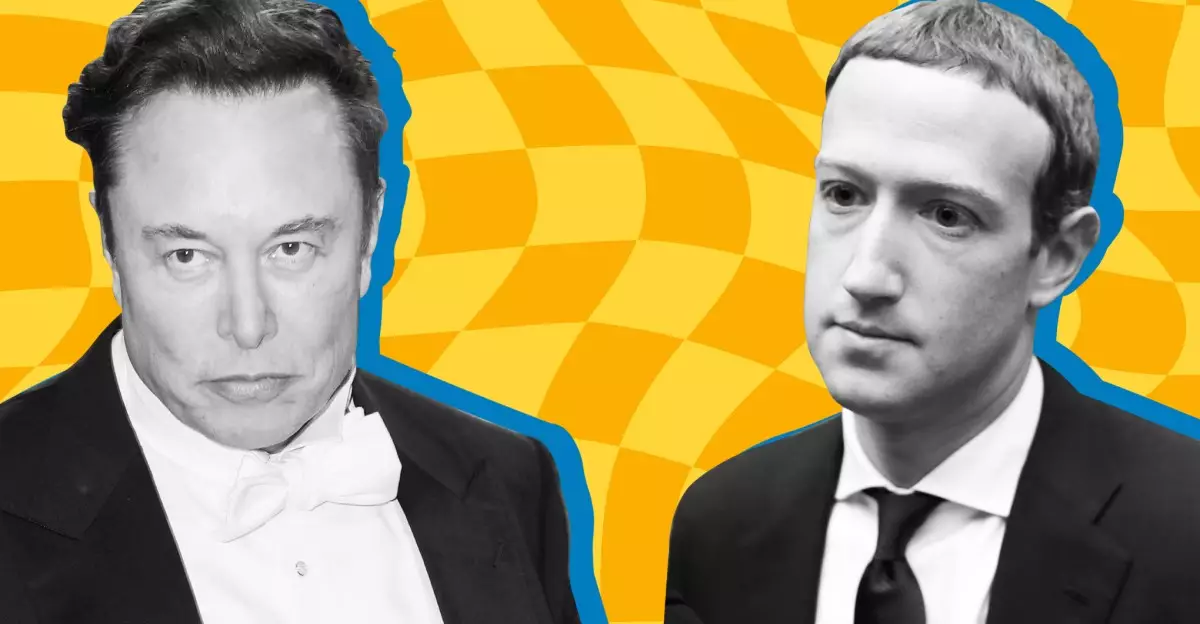The recent incident involving hacked crosswalk buttons in California, featuring the AI-generated voices of tech giants Elon Musk and Mark Zuckerberg, has captured public attention in both humorous and thought-provoking ways. While on the surface, the voice recordings may seem like harmless pranks, they unearth deeper conversations about the implications of artificial intelligence and the role of tech CEOs in shaping societal issues. The blend of humor in these recordings acts as a double-edged sword, critiquing the personalities involved while also drawing attention to the broader ethical concerns surrounding technology today.
In at least three cities, including Palo Alto, Redwood City, and Menlo Park, crosswalk buttons meant to assist visually impaired individuals have been compromised. Instead of offering the usual safety prompts, these buttons are now emanating audio clips that parodically mock Musk’s and Zuckerberg’s personas. Such acts of defiance present a novel form of social commentary where a technological device, typically associated with safety and assistance, is subverted for comedic effect. By blending levity with biting satire, the prankster behind this endeavor underscores a palpable discontent with how Silicon Valley’s influential figures wield their power.
The Voices of Discontent
The audio snippets, which feature the artificial renditions of Musk and Zuckerberg, cleverly mimic their distinct styles while exaggerating their most notorious traits. For instance, the fabricated voice of Elon Musk whimsically discusses the emptiness of wealth juxtaposed against the absurdity of owning a Cybertruck with alarming vulnerability. From pleading for friendship to lampooning societal issues, the impersonation does more than just entertain: it highlights Musk’s often irreverent public persona and his constant yearning for approval.
On the flip side, the voice impersonating Zuckerberg delivers critiques that resonate with a much larger audience. By alluding to challenges like “undermining democracy” and “cooking our grandparents’ brains with AI slop,” the fabricated Zuckerberg addresses the critiques leveled against Facebook and other tech monopolies. This blend of satire and biting critique reflects significant public sentiment regarding the ethical implications of technology, specifically AI, on social systems and individual welfare. Ultimately, these voice performances serve as a microcosm of societal frustration toward tech executives who seem out of touch with the public discourse.
The Role of AI in Society
The infusion of AI-generated content into everyday life raises essential questions regarding the ethical boundaries of technology and its use. While advances in AI have revolutionized numerous industries, they also come with complexities that are often overlooked. The crosswalk button scenario highlights the vulnerability of technology to manipulation and the repercussions of such actions. Are we, as a society, comfortable with the idea that AI can be deployed in frivolous, yet provocative pranks, questioning the integrity of crucial public services?
On one hand, the humorous aspect of this prank underscores a collective skepticism toward the role of tech companies in our lives. On the other hand, it illustrates the tensions surrounding the unregulated nature of AI technologies that have infiltrated various aspects of daily life. As such technologies evolve, they often extend beyond their intended purposes, sparking debates about accountability for misuse and the implications of uncontrolled tech reach.
A Reflection of Celebrity Culture
It’s worth noting that the prank also embodies the broader phenomenon of celebrity culture within the tech industry. Consider how both Musk and Zuckerberg have built their brands in tandem with public personas that oscillate between visionary leadership and social controversy. This duality is rendered starkly in the antics surrounding the hacked crosswalk buttons — emphasizing how, even in moments of humor, their influence casts a long shadow over social issues.
By transforming benign urban infrastructure into vehicles for satire, this act encourages dialogue about accountability in technology. It calls attention to the repercussions of technocratic governance and the role industry leaders play in crafting societal landscapes. As we laugh at the ridiculousness of Musk and Zuckerberg’s AI voices, we must also confront the substantive challenges their technologies present.
In the end, moments like these provide not just laughter, but an opportunity for reflection. While pranks may superficially seem inconsequential, they can spark important conversations that challenge the status quo of technology and its creators. In a world increasingly dominated by technology, it’s vital to scrutinize the policies and personalities shaping our collective future. The crosswalks speak; perhaps now it’s our turn to listen—and respond.

